Ancient Chinese Philosophy developed during the Spring and Autumn Period (c. 772-476 BCE) and the Warring States Period (c. 481-221 BCE) in ancient China. This was the era known as the Hundred Schools of Thought, referring to many different philosophical schools active at this time, not just 100 of them.
There were ten major and four minor schools that emerged from this time as the most popular. The following collection focuses on three of these: Legalism, Confucianism, and Taoism. Buddhism, which is considered both a philosophy and a religion (as is Taoism), is omitted as it did not develop from the Hundred Schools of Thought.





